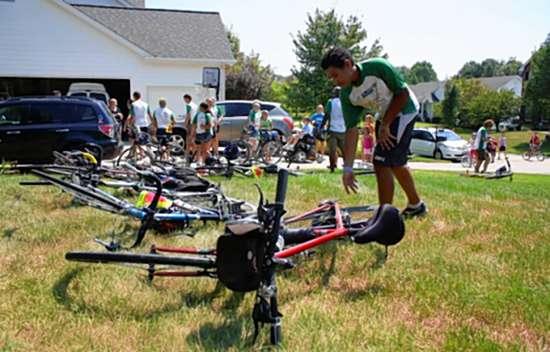Earlier this month, I spent time with the King Family who live in Weldon Spring, Mo. Their son, Tyler, has been diagnosed with Duchenne Musular Dystrophy. Through my day job, I’m constantly writing about mesothelioma, so I understand how frustrating it can be for families like the Kings who have been impacted by a rare disease that doesn’t receive much media attention. 
This is why I spent four hours at their home and even hitched a ride with the cyclists’ caravan down Highway 94. Just to make sure I had all the information to write the best story I could.
The final article took me three hours to write. It was a hard topic to write about – to stay honest about the fact that DMD has no cure, but, also, present the optimism and hope, I observed from everyone there that day. I hope I succeed. You can click here to read the article or I’ve pasted it below.
From Cali to the Jersey Shore
Cyclists spanning the country for a cause stop in Weldon Spring
By Sarah Whitney, For the Journal
Saturday, August 14, 2010 3:05 AM CDT
Just after 2 o’clock in the afternoon Aug. 7, 14-year-old Tyler King pushed the joystick on his motorized wheelchair forward and raced toward “heaven.”
But the parade of cyclists whizzing down his street in Weldon Spring beat him there.
“I couldn’t go any faster. The chair only goes so fast,” Tyler said later.
Once they dismounted, each cyclist shook hands with Tyler and introduced themselves.
The cyclists, called the JettRiders, are a group of teenagers and adult leaders biking across the United States to raise money for research and awareness about Duchenne muscular dystrophy – the disease Tyler lives with.
The cyclists started their cross-country journey June 24 in San Francisco by dipping their back tires in the Pacific Ocean. They had biked 2,642 miles to reach Tyler’s home, a place 14-year-old cyclist Clari De La Cruz of Naperville, Ill., called “heaven on earth.”www.jettfoundation.org or call 781-585-5566.
Biking cross-country and sleeping night after night in tents pitched on concrete or gravel has given the riders, who are mostly teenagers, an appreciation of the simple things in life, she said.
Things like grass.
“We love grass now. We see grass now and it’s like, ‘Hallelujah,'” De La Cruz said, lifting her hands toward the sky.
If they get excited about grass, the cyclists must have been ecstatic last Saturday to stay at Tyler’s home, complete with air conditioning and a backyard pool. It seemed like a palace, cyclist Kristin Schilling, 16, of Hanover, Mass., said.
LIVING EACH DAY
Tyler was diagnosed with Duchenne muscular dystrophy at 5.
“He used to walk,” said Kim King, Tyler’s mother. “It started getting tough when he was in fifth grade, (when) he started using a wheelchair full time.”
Duchenne is a progressive muscle-wasting disease with no cure. It’s caused by a genetic mutation that can only affect boys.
“With us, our muscles get tired and it’s fine,” said Sara Perszyk, a pediatric nurse of 30 years and a JettRide leader. “(Those with Duchenne) can’t repair their muscles, so they just go away.”
Perszyk cares for boys who have Duchenne. She’s watched the disease waste away patients’ bodies. They go from being able to walk to using a wheelchair, from being able to eat to needing a feeding tube, from being able to breathe to using a ventilator, she said.
“You see it one ability at a time – it just goes away,” she said.
But the King family has hope. When Tyler was first diagnosed, boys with Duchenne were only living into their late teens. Now, Perszyk confirmed, better treatment options have extended that life expectancy to late 20s.
King said her family focuses on making every day the best.
“We do things that we know he can do instead of sitting home and thinking about all the things he can’t,” she said. “He’s done more things in his 14 years of living than what any kid could dream of doing.”
That includes regular trips to Cardinals games, visiting Wrigley Field in Chicago, taking in a Notre Dame football game and watching an NBA game in Memphis.
One out of every 3,500 boys is diagnosed with Duchenne. In the U.S., about 15,000 boys and young men have the disease.
“We have hope, but there’s no cure or any effective treatment,” said Arlen Hall, 52, who helped coordinate the 2010 JettRide with his professional cycling group Biketernity and the Jett Foundation. “It was a natural for our group to ride our bikes for the boys who couldn’t.”
FINISHING UP THE JOURNEY
Throughout the JettRiders’ trip, the cyclists have stayed with families, like the Kings, who have a loved one diagnosed with Duchenne.
“We’re finding Duchenne families we can meet. We’re listening to their stories and talking to their son or sons. And (then) we can share that with other people as we travel across the country,” Hall said.
The JettRiders expect to complete their journey on Aug. 27. They will log 3,810 miles once they reach Pleasant Point, N.J., where they will dip their front tires in the Atlantic Ocean, “thereby making the connection across the whole country, connecting one ocean to the next through” their bicycles, Hall said.
Perszyk and the other cyclists – many who have brothers or close friends who have Duchenne – said the challenges of their journey pale in comparison to those faced by their loved ones.
“Whatever trouble I’m going through is nothing compared to what they go through on a daily basis,” Schilling said.
For more information, visit